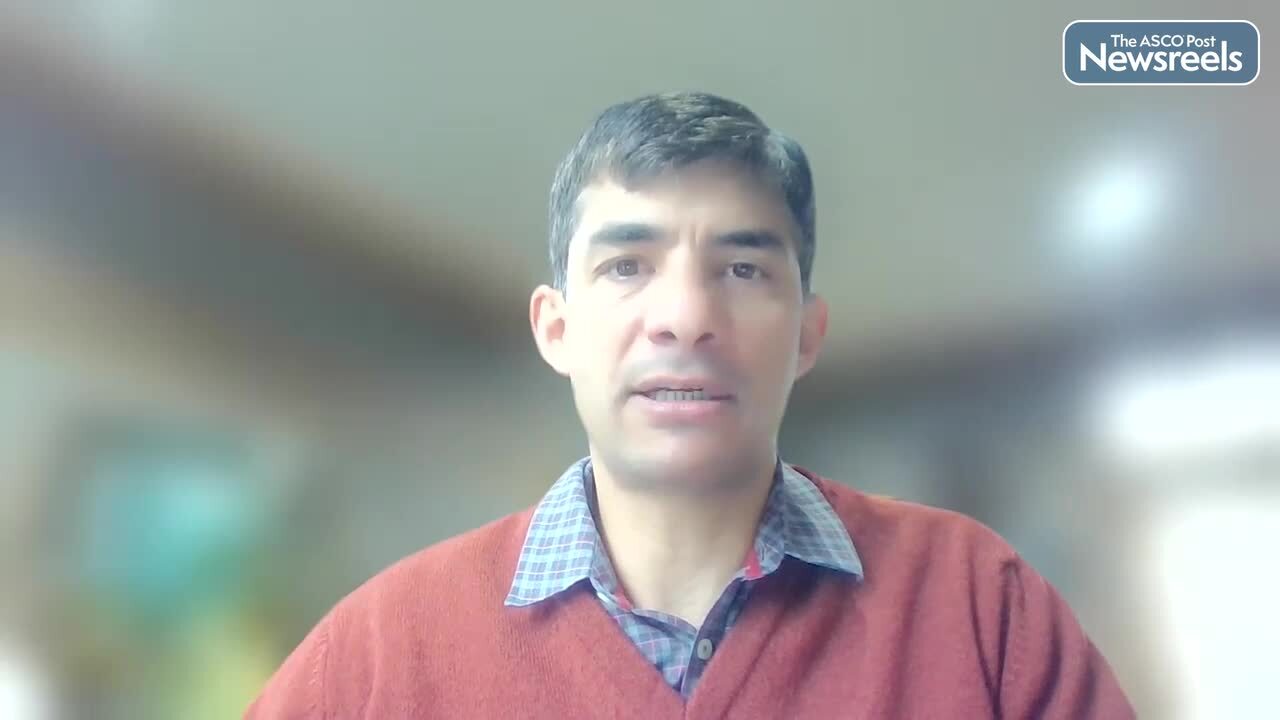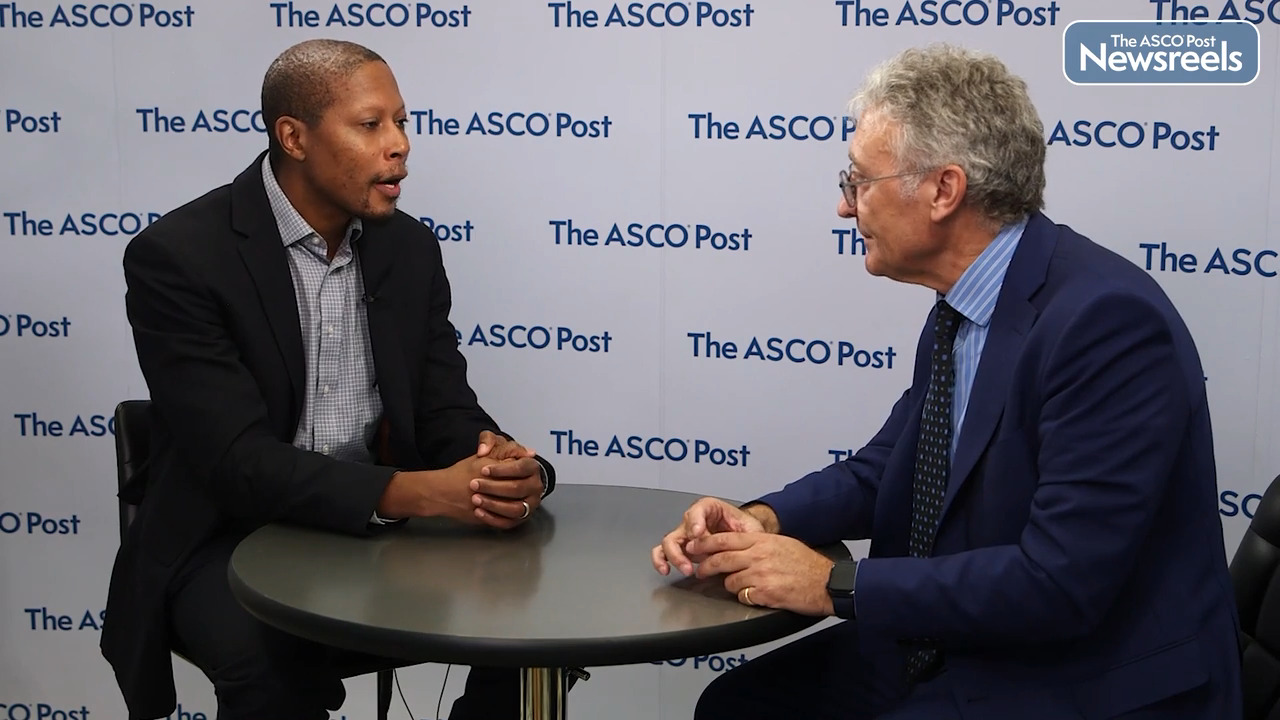Muhit Özcan, MD, on DLBCL: Early Results on Zilovertamab Vedotin
2023 ASCO Annual Meeting
Muhit Özcan, MD, of Turkey’s Ankara University School of Medicine, discusses phase II findings from the waveLINE-004 study. It showed that the antibody-drug conjugate zilovertamab vedotin had clinically meaningful antitumor activity in patients with relapsed or refractory diffuse large B-cell lymphoma (DLBCL) who experienced disease progression after, or have been ineligible for, autologous stem cell transplantation and/or chimeric antigen receptor T-cell therapy (Abstract 7531).
Transcript
Disclaimer: This video transcript has not been proofread or edited and may contain errors.
Muhit Özcan, MD:
Treatment options are limited for patients with relapsed or refractory diffuse large B-cell lymphoma who are ineligible for or who have disease progression after autologous stem cell transplant and CAR T-cell therapy. ROR1 is an oncofetal transmembrane protein that's expressed in various hematological malignancies, including diffuse large B-cell lymphomas. Zilovertamab vedotin is an antibody drug conjugate compressing an anti-ROR1 monoclonal antibody plus a cleavable linker and the anti-microtubule cytotoxin monomethyl auristatin E.
Here, we present early results from the single-arm, open label, phase-II waveLINE-004 study, which is designed to evaluate the efficacy and safe zilovertamab vedotin in patients with relapsed or refractory diffused large B-cell lymphoma who are ineligible for or who have disease progression after autologous stem cell transplant or after CAR T-cell therapy.
Patients in waveLINE-004 received zilovertamab vedotin at 2.5 milligram per kilogram intravenously every three weeks. The primary endpoint was objective response rate, and the secondary endpoint was safety and tolerability. Safety was evaluated in all patients who received at least one cycle of study treatment, and efficacy was evaluated in all patients who received at least one dose of study treatment and had at least three months of follow-up.
At the data cut-off, 40 patients had received treatment. The median age of patients was 68 years, 60% of patients had received three or more prior lines of therapy, 25% of patients had undergone prior stem cell transplant, and 28% of them had undergone prior CAR T-cell therapy. The objective response rate among the 20 patients with at least three months follow up was 30%, with two patients achieving a complete response and four patients achieving a partial response. An additional five patients had stable disease for a disease control rate of 55%, 95% confidence interval, 31.5 to 76.9%. Five patients had progressive disease and four patients could not be assessed.
When change in target lesion size was evaluated, 13 or 20 patients had any reduction from baseline, and seven patients had a reduction in target lesion size of 50% or more. Treatment-related adverse events of any grade occurred in 70% of patients, most commonly diarrhea in 23, anemia in 20, neutropenia in 18, and neutrophil count decrease in 18% of patients. Grade 3 or 4 treatment-related adverse events occurred in 40% of patients and no that's due to treatment-related adverse events occurred. One patient discontinued treatment because of grade 3 treatment-related ketoacidosis. Treatment-related peripheral neuropathy occurred in 15% of patients over grade 1 or 2. No infusion-related reactions or treatment-related tumor lysis syndrome occurred.
In summary, these earlier results from waveLINE-004 showed that zilovertamab vedotin had clinically-meaningful antitumor activity and manageable safety in patients with relapsed or refractory diffused large B-cell lymphoma who are ineligible for or who have had disease progression after autologous stem cell transplantation or after CAR T-cell therapy. These results support the continued investigation of zilovertamab vedotin in patients with relapsed or refractory diffused large B-cell lymphoma.
Related Videos
The ASCO Post Staff
Cathy Eng, MD, of Vanderbilt-Ingram Cancer Center, and Lars Henrik Jensen, MD, PhD, of the Danish Colorectal Cancer Center South and the University Hospital of Southern Denmark, discuss phase III results from the Scandinavian NeoCol trial, which showed that neoadjuvant chemotherapy is not superior to standard upfront surgery in terms of disease-free and overall survival in patients with colon cancer, although there are certain circumstances when this approach may have more favorable outcomes (Abstract LBA3503).
The ASCO Post Staff
Shailender Bhatia, MD, of the University of Washington and Fred Hutchinson Cancer Center, discusses phase I/II results on the efficacy of nivolumab with or without ipilimumab in patients with recurrent or metastatic Merkel cell carcinoma. The study found that, for this rare and aggressive skin cancer, nivolumab showed clinical activity in advanced disease. However, these results from CheckMate 358 do not suggest an additional benefit with ipilimumab added to nivolumab (Abstract 9506).
The ASCO Post Staff
Bobbie J. Rimel, MD, of Cedars-Sinai Medical Center, and Kathleen N. Moore, MD, of the Stephenson Oklahoma Cancer Center at the University of Oklahoma, discuss phase III results from the MIRASOL trial, which showed that mirvetuximab soravtansine-gynx prolonged overall survival vs investigator’s choice chemotherapy in patients with platinum-resistant ovarian cancer with high folate receptor-alpha expression. The findings suggest a new standard of care for this disease (Abstract LBA5507).
The ASCO Post Staff
Thierry Conroy, MD, of the Institut de Cancérologie de Lorraine, discusses phase III findings from the PRODIGE 23 trial, showing that neoadjuvant chemotherapy with mFOLFIRINOX followed by chemoradiotherapy, surgery, and adjuvant chemotherapy improved all outcomes, including overall survival, in patients with locally advanced rectal cancer compared with standard chemoradiotherapy, surgery, and adjuvant chemotherapy (Abstract LBA3504).
The ASCO Post Staff
Tycel J. Phillips, MD, of City of Hope National Medical Center, and Emanuele Zucca, MD, of the Oncology Institute of Southern Switzerland and the International Extranodal Lymphoma Study Group, discuss findings from the largest prospective study of patients with primary mediastinal B-cell lymphoma. The trial data support omitting radiotherapy in patients who achieve complete metabolic response after immunochemotherapy (Abstract LBA7505).





